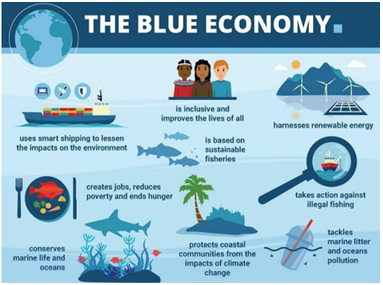

13th September 2025 (11 Topics)
Context:
Kerala will host the two-day ‘Blue Tides-Two Shores One Vision’ conclave on September 18–19, bringing together Indian and European stakeholders to promote a sustainable blue economy.
Blue Economy
Definition & Concept
- Blue Economy: Sustainable use of ocean, sea, and coastal resources for economic growth, improved livelihoods, and job creation, while protecting ocean ecosystems.
- World Bank: “Sustainable use of ocean resources for economic growth, improved livelihoods, and jobs while preserving the health of the ocean ecosystem.”
- European Commission: Covers “all economic activities relating to oceans, seas, and coasts” including established and emerging sectors.
Key Principles:
- Balance economic development with environmental sustainability.
- Address challenges: climate change, pollution, overfishing, marine biodiversity loss.
- Long-term goal: marine resilience and inclusive growth.
Objectives of Blue Economy
- Foster economic growth without degrading ocean health.
- Enhance employment, livelihoods, and food security through sustainable fisheries, tourism, and aquaculture.
- Promote innovation in marine biotechnology, ocean-based renewable energy, and coastal infrastructure.
- Minimise marine pollution and conserve biodiversity.
- Support climate-adaptive coastal infrastructure.
Blue Economy 2.0 (India)
- Focus: Climate-resilient development, restoration of coastal ecosystems, and sustainable expansion of aquaculture/mariculture.
- Policy Alignment:
- Interim Budget 2024 highlights Blue Economy 2.0.
- Linked to Vision 2025 and Deep Ocean Mission (2021).
- Key Components:
- Coastal Ecosystem Restoration: Mangroves, coral reefs, shoreline protection, beach nourishment.
- Sustainable Aquaculture &Mariculture: High-value marine species, seaweed farming, eco-friendly practices with funding & subsidies.
- Integrated Multi-Sectoral Approach: Coordination across shipping, ports, tourism, energy, biotech sectors using tech-driven planning.
Need for Blue Economy
- Vast Marine Resources: Oceans cover 75% of Earth, 97% of water, 99% of living space.
- Global Economic Significance: Oceans contribute 3–5% of global GDP (~USD 1.5 trillion; projected USD 3 trillion by 2030).
- Human Dependency: 40% of global population lives in coastal areas; 80% of trade via maritime routes.
- Climate Mitigation: Oceans absorb 30% of CO? emissions; sustainable management enhances carbon sink potential.
- Renewable Energy: Offshore wind, tidal, and wave energy for energy security and carbon reduction.
- Pollution Control: Plastic and chemical pollution mitigation; 33 billion pounds of plastic enter oceans annually.
Blue Economy in India
- GDP Contribution: ~4%.
- Key Sectors: Fisheries, aquaculture, shipping, tourism, offshore energy.
- Geography: 7,500 km coastline; 2.02 million sq km EEZ.
- Employment: Fisheries sector supports ~3.5 million directly, 30 million indirectly.
- Initiatives:
- Draft Blue Economy Policy
- Sagarmala Project: Modernise ports, enhance coastal industries & communities.
- Deep Ocean Mission: Scientific exploration & resource utilisation.
- O-SMART: Services, Technology, Resources, Observations, Science.
- India-Norway Task Force (2020): Sustainable blue economy cooperation.
- National Policy on Marine Fisheries (2017): Sustainable fisheries, MPAs, livelihood enhancement.
Importance
- Economic: Job creation, trade growth, marine biotech, shipping, fisheries, tourism.
- High ROI: $1 invested ? $5 return in key ocean activities.
- Environmental: Mitigates climate change, conserves marine biodiversity.
- Social: Supports SDG 14 “Life Below Water”.
- Strategic: Maritime security, coastal resilience, energy security.
Challenges
- Overfishing: 34% global fish stocks overexploited (FAO).
- Marine Pollution: ~8 million tonnes of plastic annually.
- Climate Change: Ocean warming, coral bleaching, species migration, acidification.
- Weak Governance: Insufficient enforcement of marine regulations
Way Forward / Strategic Measures
- International Cooperation: Strengthen regional partnerships (e.g., IORA).
- Sustainable Aquaculture: Ecosystem-based management.
- Infrastructure Investment: Ports, coastal facilities, renewable energy installations.
- Blue Finance Mechanisms: Blue bonds, climate finance, public-private partnerships.
- Marine Spatial Planning (MSP): Coordinated ocean use for fishing, tourism, shipping.
- Technology & Innovation: Ocean monitoring, marine biotechnology, climate-resilient coastal infrastructure.
More Articles


